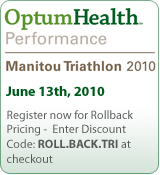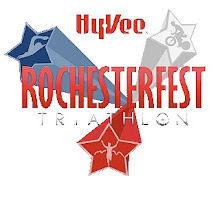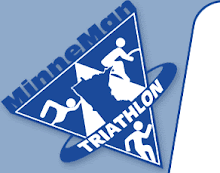
(This story, like most contributions to MTN, is unedited. Photos: Left Side - 1. Matt after IMMOO, 2. Matt and family. Right side - 1. Captain Morgan, 2. Matt with triathlete/dad, Lynn, 3. Matt finishing Ironman Wisconsin.)
By Matt Nelson
ALCOHOLISM, SOBRIETY, and ENDURANCE SPORTS = Serenity
Hello, my name is Matt and I AM an ALCOHOLIC!
My drinking didn't really start until I was about 21 yrs old. During my high school years, I was mostly consumed with playing what ever sport was in season and was actually opposed to drinking-though I did try it couple times. Once I actually turned 21, I found what I thought was a true acquired taste for beer. I drank for about 15 yrs pretty consistently, and at times heavily I really enjoyed my beer but wasn't opposed to a nice a Captain Morgan and Coke. I had my limits though and refused to drink Blatz or Shlitz; however, this was just a speed bump which had me convinced that for many years that I wasn't a true alcoholic. :) I managed to somewhat "control" my drinking for many years but eventually I found myself slowly losing control wanting more and more. I became preoccupied about when my next drink would be, and I eagerly awaited it with anticipation. Needless to say, my tolerance had increased tremendously. I began to feel ashamed of wanting or feeling as though I needed more.

I haven't had a drink since July 17th, 2005. Ironically, I was watching the LifeTime Fitness Triathlon the day before I had my last drink. I had been training to compete in my first triathlon, while still drinking heavily. The Northwoods Triathlon was coming up on August 13th, only a month later. I soon discovered achieving good fitness was a difficult task while drinking heavily. (Smile)
At the age of 35 I realized, or should I say, finally accepted that I was an alcoholic. I thought in order to be an alcoholic one had to live under a bridge and drink out of a paper bag from dawn until dusk or have numerous consequences such as having many DWI's. I was fortunate to not have had many consequences other than tremendous emotional turmoil. Those who do not have chemical dependency issues can probably not relate to this.

Most people would have viewed me as a happy go lucky type of guy when I drank. Even my closest friends were surprised when I told them that I quit and that I had been struggling with my drinking. In fact, it took me a lot longer to realize or accept my disease because I did not suffer from obvious consequences, such as losing a job or getting a DWI.

I learned from first hand experience that the disease is progressive. I switched from social, to periodic binge drinker all the way to a closet drinker. I was soon content to isolate myself and drink by myself for weekends at a time. One may think, "Wow, you were one sick dude!" My answer would be "Yes! I sure was. And I hope to never go back there again." At the end of my drinking career, I was lonely and depressed. I was baffled that I sought relief from my pain through the bottle despite logically knowing it would only get worse. This cycle was repeated over and over. The strength of my own denial and the aggressiveness of the disease allowed me to justify my actions. "I'm just going through a tough time and I will soon quit.” Quitting for me was far more difficult than I had ever imagined-in fact it was a living nightmare. Each time I drank I was under the illusion that this time it was going to be different. I believed I would some day be able to control my drinking and enjoy it like my “normal” friends. In reality, I was stuck in the cycle, wondering what was happening. I hadn’t accepted that I couldn’t drink like normal people. I wasn't able to stop completely, and I continued searching for an answer.
Insomnia and anxiety permeated my nights while trying to get sober. These feelings combined with depression had me chasing the drink time and time again for some type of relief from the agony. The drink would give me a moment of relief from the misery, but needless to say didn't last. The definition of insanity is “Doing the same thing over and over expecting different results." If that's the case, I was certainly insane and didn't learn or comprehend this until I joined A.A. where I found my solution.
I'm not ashamed of being an alcoholic. I didn't raise my hand one day and say I wanted to have this disease. I was simply dealt the cards I was dealt, and it took me a while to find the solution that works for me. I simply did not know how to stop.
A big misconception of alcoholism is that we alcoholics don't have any "willpower" or aren't strong enough to know when to stop. What I learned is that I have an allergy to alcohol (go ahead and look up the definition). My belief is that we (alcoholics) have an allergy of the body and obsession of the mind. Through my work with AA, this made complete sense to me.
It can be quite humbling admitting and sharing a small glimpse of the road I have once traveled. I wouldn't expect many people to ever fully comprehend the disease. It helps me to share my story with other alcoholics and others whom do not have a lot of experience or knowledge about the disease. I'm simply sharing my experiences in hopes that others may have a tiny bit more insight into how serious the disease is. There is a solution if one is ready to completely surrender.
I can only speak from my own personal experience. My solution is the program of Alcoholics Anonymous. A big part of my recovery is working the 12 steps of A.A. and by sharing my strength, hope and experience of my recovery to others like myself.
If I hadn't been introduced to this program I'm not sure where I'd be or if I'd be alive today A.A has taught me many things- most importantly how to live life on life's terms without the use of alcohol. Sure I use to use alcohol for many reasons and some didn't make any sense. I sometimes used it to self medicate during times of emotional struggles. It was an escape-an escape to change the way I felt. Alcoholism is deceptive that way. I thought it was the solution. The solution quit working after awhile. For whatever reason, the bottom line is that I drank because I am an alcoholic. The progression of the disease during the last year and a half of my drinking made it increasingly difficult to stop. Despite (logically) knowing the ramifications of drinking during my struggles with anxiety and depression, it was not enough to convince me stop. I guess that's why they say the disease is cunning, baffling and powerful. I know I will never be cured from this disease, as its effects are lifelong. If I continue to work my program and help others like myself, my chances of staying sober increase tremendously, and for that I am grateful!

My prior exposure to triathlon was limited. I grew up playing more traditional sports such as baseball, football and basketball. I was not an accomplished runner or swimmer-despite spending summers at our family’s cabin. I was comfortable in the water, but was an inefficient swimmer. I played a little baseball in college. Running more than a mile was quite foreign to me and 3 miles was an accomplishment in my own mind. Biking had previously only been a form of transportation. Once I began training for triathlons, I found it never got easier but, with a lot of hard work, I improved my speed and endurance.
The sport of triathlon has been a tremendous outlet for me during my recovery. After completing my first triathlon in August of 2005, I remarked that the race was the most exhilarating experience in any sport I've participated in. It's like something was ignited inside of me and the desire to compete in triathlon began.
I often train and compete with my bestfriend who happens to be my dad. He turns 69 this May. To this day he can give me a run for my money on a 5k footrace.
I'm just an average age grouper who typically finishes in the top 3rd of my age group. The sport of triathlon to me isn't about winning. It's about pushing myself to that fine line of or threshold of maintaining or collapsing but finishing. It can be so many things to many different people. Sure I am racing among hundreds and in some cases thousands (Ironman) of others, but in my case I'm racing against myself.
Training for triathlon has given me a type of serenity that I have never had before. When I'm out on a run or on a training ride, it is just me and my environment. I choose not to wear head phones because that time is for me to pray and reflect on my past and future. I often take inventory of all that I have to be thankful for. It is akin to a meditative state, where I'm able to focus and feel a great sense of serenity and peace of mind. When at the end of a long ride or run, feeling pain or discomfort, I often reflect back on where I once was in my drinking days (lonely, anxious, nervous, depressed). I find great peace and realize this pain is nothing compared to what I once went through. Besides, the pain in training is the reward! Right? Personally, I thrive on getting through the pain. It's like a personal test to see if I can overcome it and maintain to the finish.
In training I reap the benefits of fitness and an emotional nirvana. I guess I'm now an "endorphin junkie, " but at least I'm sober. During training, I spend quality time training with other friends in recovery who also compete in triathlon, marathons, and Ultra marathons. I view these work outs as "bonus" work outs, taking advantage of the time to talk with someone in recovery, who can relate to my own issues. It's the dual benefit of an A.A. meeting while working out.
As many of us triathletes know, it takes a lot of dedication, sacrifice, and commitment to prepare ourselves for a race. It also takes structuring and coordination of our sometimes chaotic lives-juggling our jobs, kids, and other commitments, in order to squeeze in work outs during the week. I benefit from the satisfaction of completing a good, hard work out. The boost that I get, the "feel good" endorphins, help me personally in maintaining balance, both physically and emotionally.
During the summer of 2008, my wife agreed to support me in my desire to train for Ironman Wisconsin in 2009. I had only previously raced in two half Ironman's, and I knew I had my hands full training for a full Ironman.
My wife and I have 2 kids. Our daughter Amelia is 7 and our son Ben is 2. I'm fortunate to work only 40 hours a week, but my wife is a physician. Her hours are not only longer, but more unpredictable. Making good use of my allotted time for training was and is essential. I did my best to accommodate the family by heading out on my longer bike rides by 5 a.m. This allowed me to be home before noon and be able to help out with family responsibilities. This often took a toll on my wife, having an extremely rambunctious two year old to watch over, but I am extremely thankful for all the sacrifices she made for me during my training.
Before I knew it, Ironman Wisconsin had come and gone. I can say it was probably one of the best days of my life (aside from my wedding day and the birth of our children). Race day was a celebration and a grand finale of my 30 week training. I trained so hard and had learned so much about myself. I felt like I did the best I could that day. I was extremely fortunate to not have had any real complications, such as dehydration, cramping or mechanical issues. We all know how many different things can go wrong. I felt like I truly had to DRINK and eat (which comes natural to me:) my way to the finish line. When people asked what it felt like finishing an Ironman, the only words that really rang true to me was "HUMBLED."
Thanks for letting me share,
Sincerely,
Matt Nelson
mlbnelson@hotmail.com




































